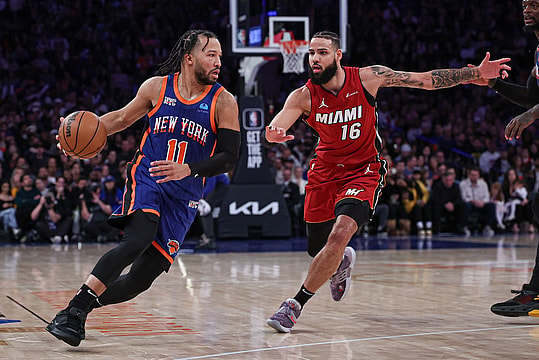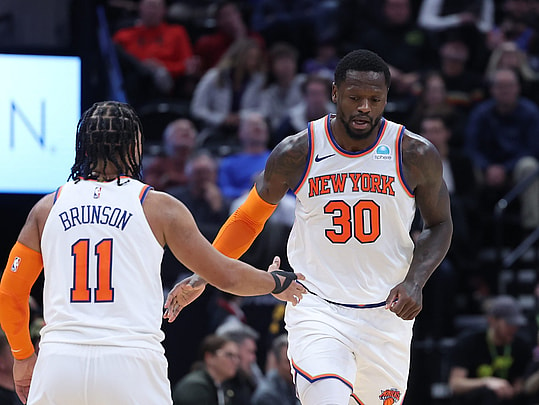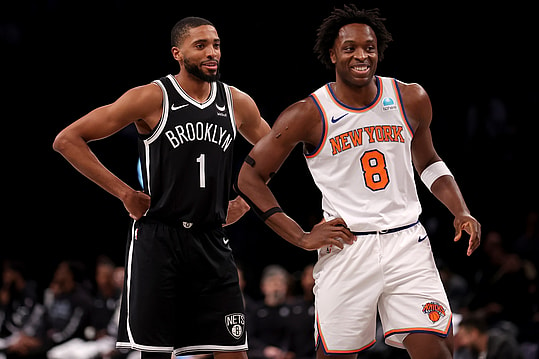
In an unprecedented move, New York Knicks superstar Jalen Brunson took a hefty pay cut and signed a four-year, $156 million contract extension earlier this month. In an era where $60 million salaries are becoming more commonplace across the league, Brunson’s team-friendly signing could have a profound impact on future transactions.
Knicks secure Jalen Brunson’s services with a massive discount

If Brunson waited until 2025 to extend his contract, he would’ve been eligible for a five-year, $269 million extension, effectively leaving $113 million on the table for the benefit of the team. At the time of writing, Brunson will be the association’s 43rd-highest paid player in the 2025-2026 season, when his extension will first kick in, easily one of the best value contracts in the entire NBA.
When Brunson first signed a four-year, $104 million contract in free agency with New York in the Summer of 2022, many critics called it an overpay, and that Brunson would never live up to his salary. Fast forward two years, and Brunson has more than outdone his contract, averaging 26.5 points in his two seasons with the Knicks, and being named to his first career All-Star, and All-NBA teams last season.
Brunson committed to building a championship contender in New York

Surely no one would have blamed Brunson had he waited until 2025 to sign an extension, but Brunson is committed to winning with the Knicks. According to ESPN’s Adrian Wojnarowski, Brunson signed his contract now instead of waiting for his max extension due to the possible drawbacks of the new league CBA, and wanted to make sure the Knicks had the best chance to build a contender.
“Brunson’s study of championship organizations and franchise stars — Patrick Mahomes’ Kansas City Chiefs, the Tom Brady New England Patriots, and the Derek Jeter New York Yankees — gave him a blueprint for MVP-level players who structured contracts to give their teams the best chances at sustainable title runs,” reported Wojnarowski.
- The Knicks are not on the same level as the Pistons right now
- Knicks: What to expect from Jose Alvarado and Jeremy Sochan for the rest of the season
- Knicks’ Mike Brown to cut Mohamed Diawara’s minutes temporarily
New CBA rules could explain Brunson’s selfless financial decision
According to Forbes, under the new CBA, teams above the first apron ($178.1 million this season) lose access to the non-taxpayer mid-level exception ($12.8 million) and bi-annual exception ($4.7 million). Additionally, teams over the first apron were previously permitted to take back 125% of the salary they sent out in a trade. Now, they aren’t allowed to take any money back, making salary-matching deals considerably more difficult.
Teams over the second apron ($188.9 million) also have similar restrictions. However, those teams also cannot aggregate contracts in trades, meaning they are only able to trade one player at a time and for less salary:
“Part of the goals we set in collective bargaining was to ensure that every team was in a position to compete for championships and had the resources available to do so,” said NBA Commissioner Adam Silver after a Board of Governors meeting at the Las Vegas Summer League. “The second apron’s financial consequences are pretty severe, but [there is also] an impact on your ability to sign players and draft players. The teams are realizing there are real teeth in those provisions.”
Given the Knicks’ rather expensive offseason to-do list which included re-signing OG Anunoby, and the ongoing contract extension talks with Julius Randle, Brunson’s selfless financial decision gives the Knicks significant flexibility for the future.
The impact of Brunson’s discount is already being felt

The 27-year-old’s decision is already having an effect internally. Recently, reports surfaced that newly acquired F Mikal Bridges, a former teammate of Brunson’s at Villanova, is likely to take a similar pay cut as Brunson and sign a team-friendly extension when it’s time to negotiate a new deal.
This offseason has seen multiple-time All-Stars such as Paul George and Klay Thompson depart to different teams in an effort to maximize their market profit. If Brunson’s financial sacrifices help the Knicks win a championship within the next few years, it’s possible that more players of his caliber will also follow suit.
Different than the traditional “Big 3” ways of team building, the Knicks could see themselves at a major advantage over other teams due to the way they’ve built their roster and saved money in the process. Time will tell if this foolproof plan works out, but if it does, it could usher in an NBA culture shock and could influence the way teams and star players go about contract negotiations in the future.
More about:New York Knicks